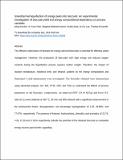| dc.description.abstract | The efficient valorization of biomass for energy-derived biocrudes is essential for effective waste management. However, the production of biocrudes with high energy and reduced oxygen contents during the liquefaction process requires further insight. Therefore, the impact of reaction temperature, residence time, and ethanol: acetone on the energy compositions and bioproduct’s yield enhancement were investigated. The biocrudes obtained were characterized using elemental analysis, GC–MS, FTIR, GPC and TGA to understand the effects of process parameters on the biocrudes’ compositions. An improved HHV (38.18 MJ/kg) and lower O/C ratio (0.11) were obtained at 430 °C, 35 min and 50% ethanol with a significant improvement in the enhancement factor, deoxygenation, and percentage hydrogenation of 2.63, 36.88%, and 77.87%, respectively. The presence of ketones, hydrocarbons, phenolics and aromatics of 23.74, 4.28, 37.20 and 17.81% respectively indicate the potential of the obtained biocrude as renewable energy sources upon further upgrading. | en_US |

